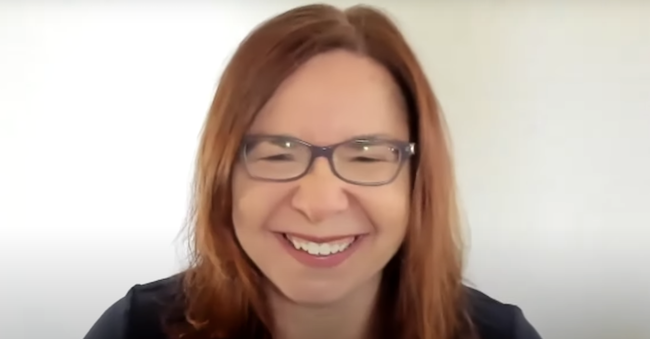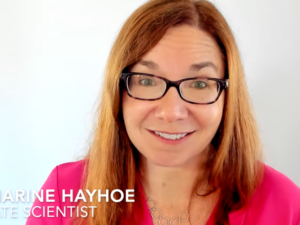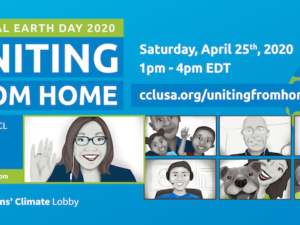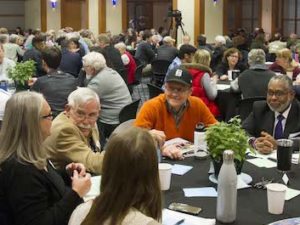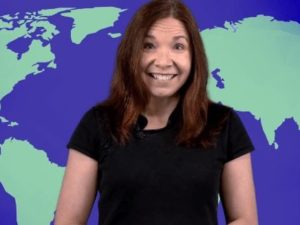Dr. Katharine Hayhoe’s Earth Day 2020 message
By Shana Janis
This year’s Earth Day was one for the books. It was the 50th anniversary of the event, marking half a century of environmental awareness and action. It also happened in the midst of national stay-at-home recommendations due to the COVID-19 pandemic, so our volunteers’ normal grassroots outreach activities weren’t possible. Despite the unique circumstances, CCL and our volunteers wanted to make this day special, so we held a virtual Earth Day celebration.
On April 25, 2020, 2,414 people attended CCL’s virtual Earth Day event through Zoom, and another 464 watched live on Facebook, Twitter or YouTube. People tuned in from every state in the United States, as well as from Australia, Belgium, Canada, Costa Rica, Ethiopia, Egypt, France, Gambia, Germany, Japan, Mexico, New Zealand, Norway, Peru, and the United Kingdom. Attendees heard from keynote speaker Dr. Katharine Hayhoe, a world-renowned climate scientist, and then moved on to one of four breakout sessions. One of the breakout sessions was a panel with CCL volunteers who come from all walks of life and work on climate change for different reasons.
Watch Dr. Hayhoe’s plenary session here, or read on for a recap:
https://www.youtube.com/watch?v=prsCP44oitc?rel=0
Dr. Hayhoe’s presentation, called “Healthy People, Healthy Planet,” first began with some myth-busting:
Myth 1: I have to be a certain type of person to care about the planet.
There are many definitions of what an environmentalist may be, but Dr. Hayhoe says it’s actually pretty simple. “If I were going to define an environmentalist, I would put a big red X through all the definitions that Google gives us. I would simply say an environmentalist is a human who lives on planet earth.”
She explains, “No matter who we are, no matter where we live, no matter what part of the political spectrum we are from, no matter what country we are from, no matter what language we speak, we all live on this planet,” and that means we’re all qualified to care.
Myth 2: Issues like habitat loss, pollution, and climate change are distant issues only affecting future generations and places that are far away.
Using data from the Yale Program on Climate Change Communications, Dr. Hayhoe explains that most people in the U.S. think that climate change is happening, but do not believe it matters to them personally. “We think it matters to animals, people who live far away from us, but not us,” she says. ”The truth is, our impact on the health of our planet is already affecting us here and now.”
Dr. Hayhoe brought up the idea of “planetary boundaries,” a concept that explains the different ways we are pushing the boundaries of our planet to sustain the people, animals, and plants that live on it. She points out that this relates to the pandemic. “As we destroy natural habitat, the chances of viruses passing from animals to humans is increased. Conserving nature is essential for our health and wellbeing. Our health is at the center of the risks posed by pushing our planetary boundaries.”
Air pollution also affects us already, causing thousands of deaths a year and hitting poor neighborhoods hardest. This is especially important to discuss during this pandemic, Dr. Hayhoe says. “We know that people who live in areas that are already subject to terrible air pollution are much more vulnerable to getting very sick from or even dying from the coronavirus. New research shows that 80% of deaths across four different countries from coronavirus happened in areas where people’s lungs were already weakened from air pollution.”
Climate change exacerbates these issues, making it a clear and present threat to us today and in each of our communities. “Climate change takes all of the issues we care about today, including our health, air pollution, biodiversity, deforestation, lack of access to clean water and food and basic health care, and it makes them worse,” Dr. Hayhoe says.
It’s time to cut our emissions
“The solution isn’t to shut down the economy as we are doing now” due to the pandemic, Dr. Hayhoe says clearly. But it’s also not “to return to the Stone Age, to some type of utopia where we all live off the land. With 8 billion people, we just can’t.”
Instead, she says, “The solution is to use our energy more efficiently and get it from sources that produce less or no pollution and heat-trapping gases.” This could be through solar energy, wind, water, and others—we’re already seeing alternatives being used, just not enough. Energy efficiency improvements will also save people money, provide jobs, as well as be much healthier for the planet. But again, those changes need to happen faster.
Dr. Hayhoe says this is why we need to put a price on carbon. “Nearly every economist in the world supports putting a price on carbon. It’s because it levels the playing field, it is a free-market approach, it’s supported by countries all around the world, and is supported by conservative organizations too.”
The bottom line this Earth Day
“The pandemic has taught us that when it really comes down to it, what matters is our health and safety,” Dr. Hayhoe says. “That is what the pandemic threatens, and that is what climate change threatens too. This is why it doesn’t matter who we are, where we live, what language we speak, or where we fall on the political spectrum. To care about climate change, we don’t have to be anything other than a human that lives on planet earth.”
Dr. Hayhoe encouraged all attendees to talk more about climate change in their daily lives. She advised beginning the conversation by discussing values that you share with someone, connecting those values to climate change, and then discussing positive solutions that work.
"The number one thing we can do about #climate change is talk about it," @KHayhoe says.
Share this post or tag a friend to start the conversation this #EarthDay! pic.twitter.com/HsOfyorybL
— Citizens' Climate Lobby (@citizensclimate) April 22, 2020
Thank you to all who tuned in, and Happy Earth Day!
Shana Janis is a rising Senior at Florida State University where she is studying Advertising and Psychology. She is originally from Dunwoody, Georgia and is a Communications intern for CCL.

